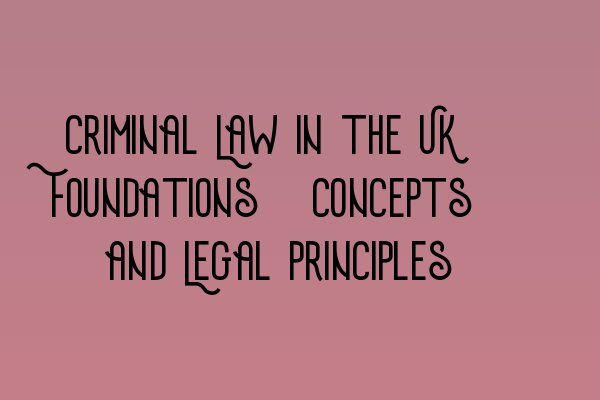Criminal Law in the UK: Foundations, Concepts, and Legal Principles
Welcome to the SQE Criminal Law & Practice Law UK blog! In this comprehensive article, we will explore the foundations, concepts, and legal principles of criminal law in the United Kingdom. Whether you are a law student, legal professional, or simply interested in gaining knowledge about the UK criminal justice system, this post will provide valuable insights.
Before we delve into the intricacies of criminal law, it is important to note that SQE Criminal Law & Practice Law UK offers top-notch preparation courses for aspiring solicitors. If you’re preparing for the SQE 1 or SQE 2 exam, we highly recommend checking out our SQE 1 preparation courses and SQE 2 preparation courses to boost your chances of success.
1. Understanding Criminal Law
Criminal law is a branch of law that deals with offenses committed against society as a whole, rather than just between individuals. It sets out the rules and regulations regarding prohibited conduct, as well as the consequences and penalties for those found guilty of committing criminal acts.
Being familiar with the basic concepts of criminal law plays a crucial role in understanding the legal system. One important principle is the presumption of innocence, which states that a person is considered innocent until proven guilty. This ensures fairness and protects individuals from wrongful conviction.
If you’d like to test your knowledge on criminal law concepts, check out our SQE 1 Practice Exam Questions to prepare for the SQE 1 exam.
2. Criminal Offenses and Legal Principles
In the UK, criminal offenses are categorized into two types: summary offenses and indictable offenses. Summary offenses are less serious crimes that can be tried without a jury, while indictable offenses are more serious crimes that require a trial by jury.
Legal principles such as actus reus (guilty act) and mens rea (guilty mind) play a vital role in the determination of criminal liability. Actus reus refers to the physical element of a crime, while mens rea refers to the mental state or intention of the accused.
For an in-depth understanding of criminal offenses and legal principles, our SQE 1 Practice Mocks FLK1 FLK2 can further enhance your knowledge and exam preparation.
3. Criminal Procedure and Sentencing
The criminal procedure encompasses the series of steps and rules followed from the investigation and arrest to the trial and final judgment. It ensures that the accused receives a fair and impartial trial, with all evidence presented in a transparent manner.
Once a person is found guilty of a criminal offense, the court imposes a sentence as a means of punishment. Sentencing options can vary widely and may include fines, community service, probation, or imprisonment, depending on the seriousness of the offense.
If you’re looking for information on the upcoming SRA SQE exam dates, visit our article on SRA SQE Exam Dates to stay updated.
4. Conclusion
Criminal law in the UK is a vast and intricate field that plays a vital role in maintaining justice and order within society. Understanding the foundations, concepts, and legal principles of criminal law is essential for anyone involved in legal studies or practice.
At SQE Criminal Law & Practice Law UK, we are dedicated to supporting aspiring solicitors in their journey towards becoming successful legal professionals. Explore our range of SQE exam preparation courses and resources to ensure you are well-prepared for the challenges ahead.
Thank you for reading, and if you have any questions or require further assistance, feel free to reach out to our team. Happy studying!
